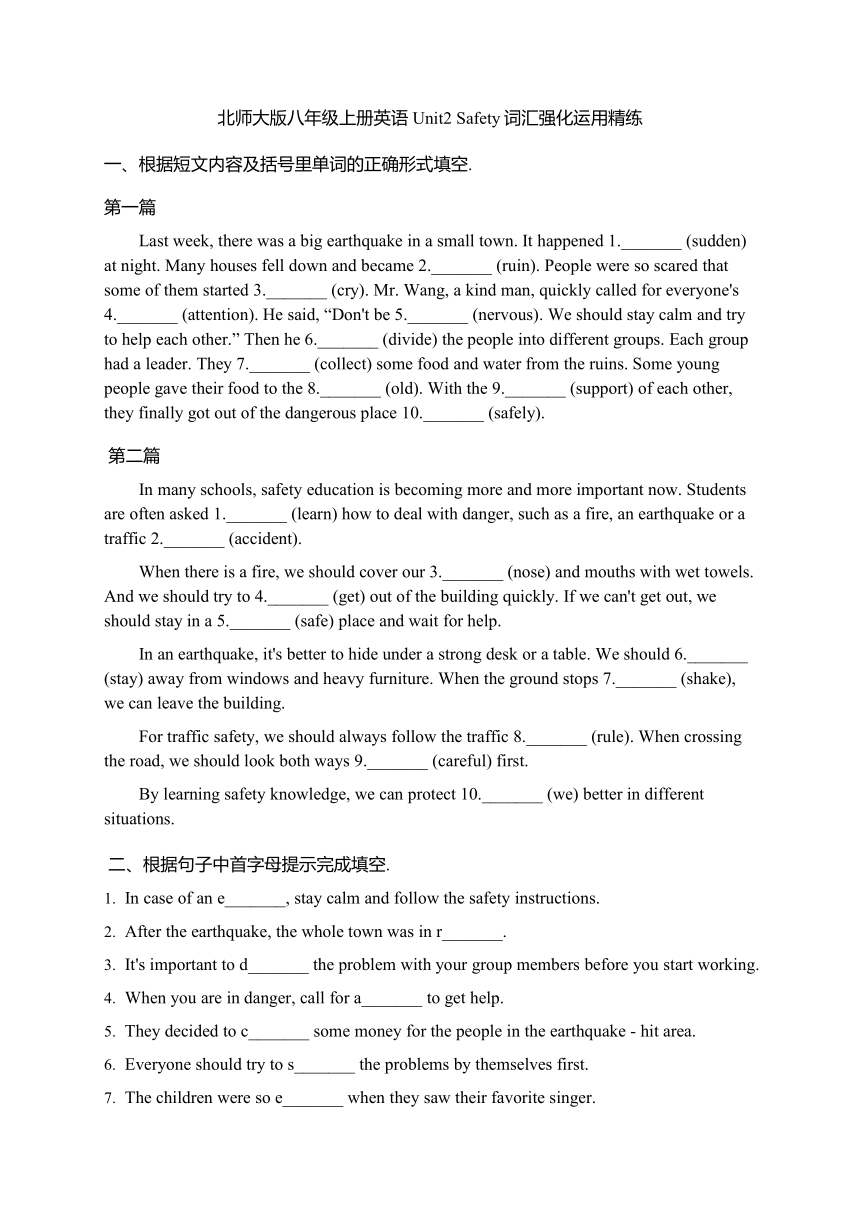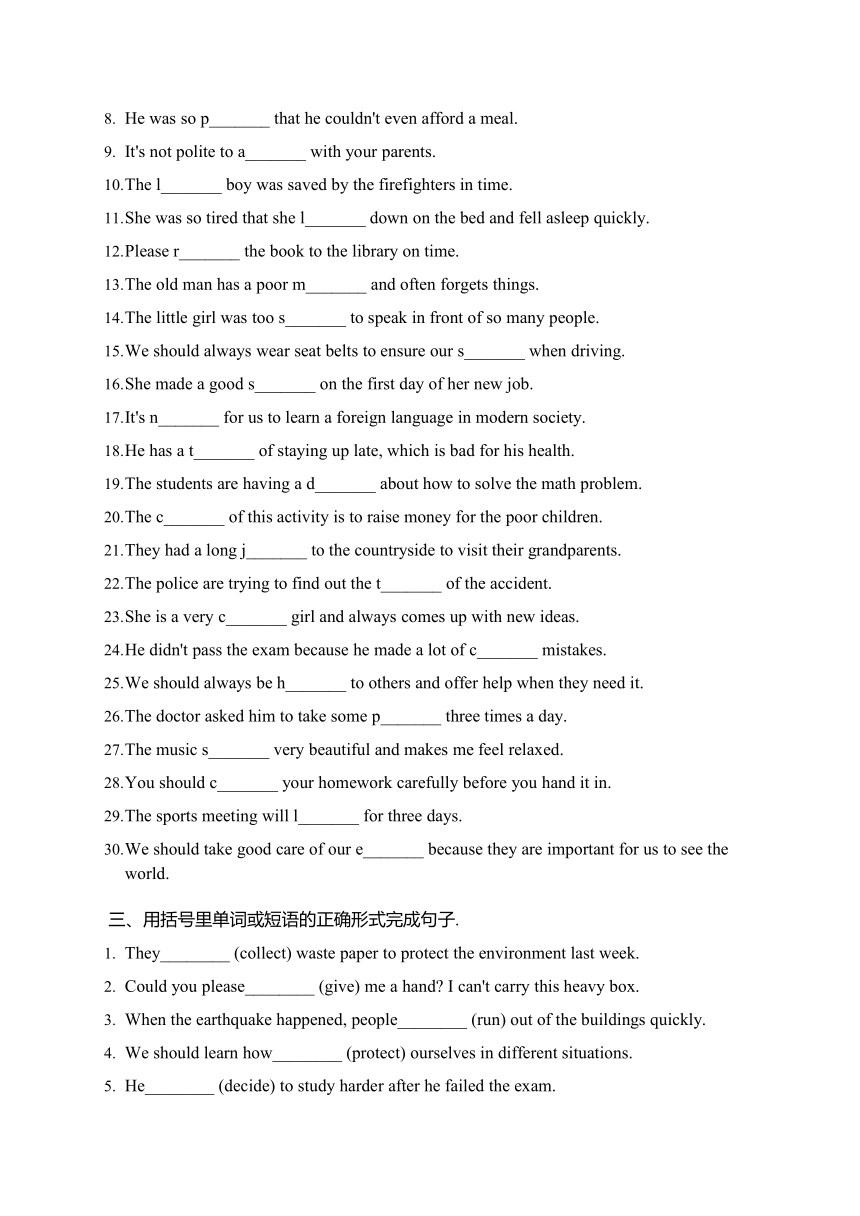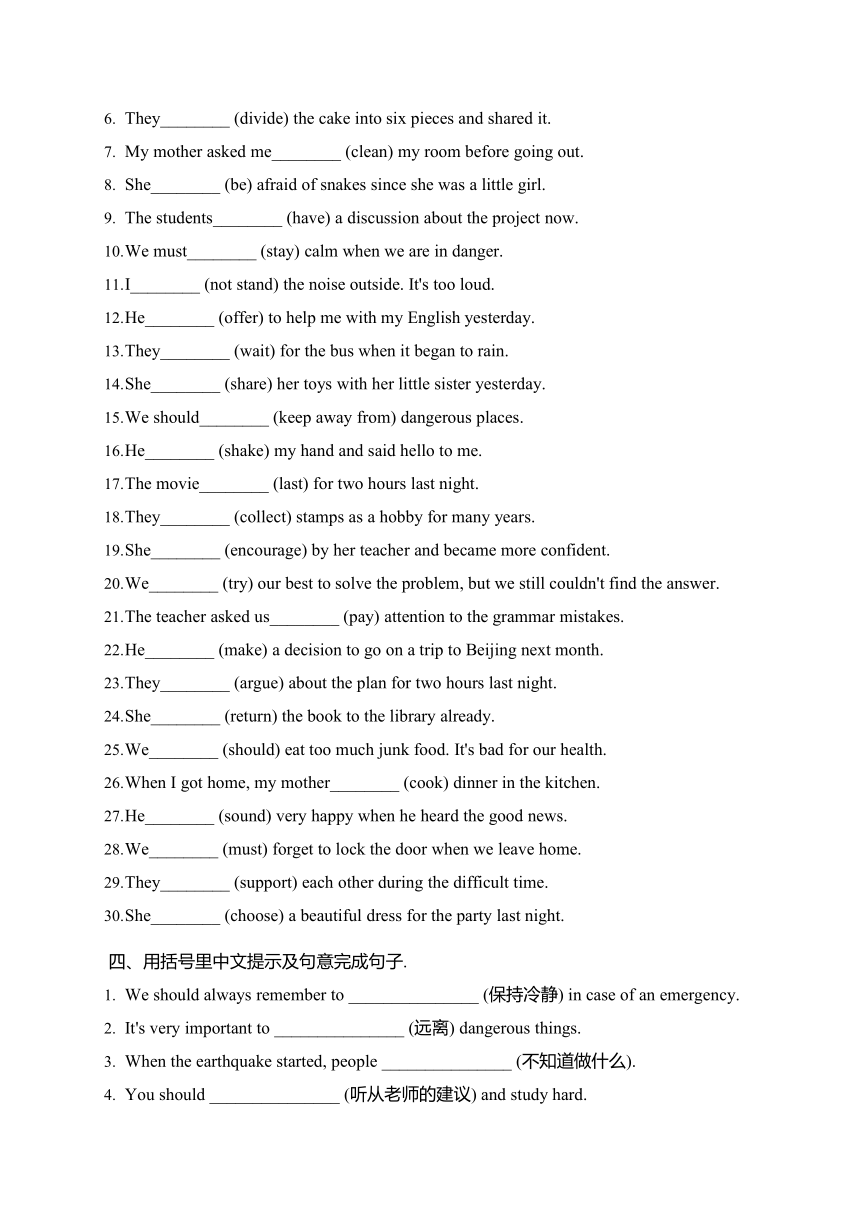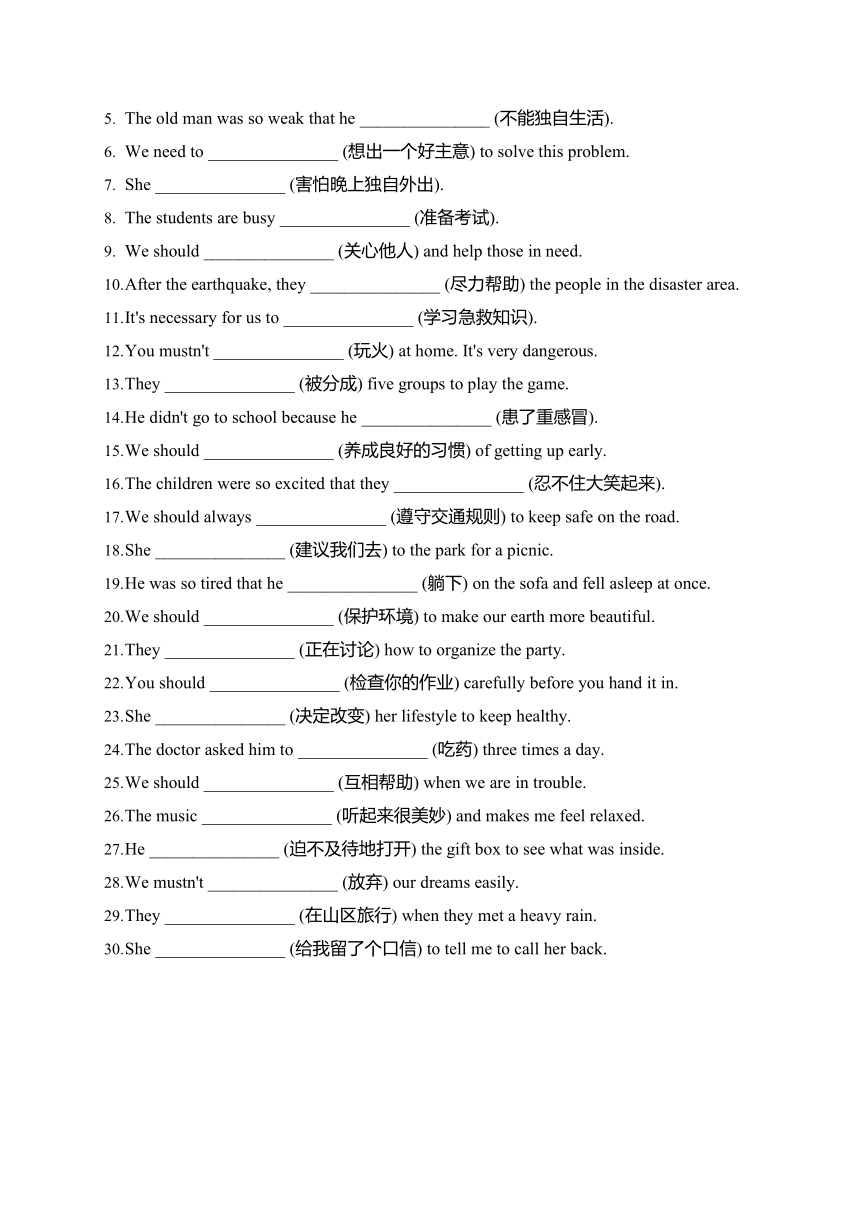北师大版(2024)八年级上册英语Unit2 Safety词汇强化运用精练(含解析)
文档属性
| 名称 | 北师大版(2024)八年级上册英语Unit2 Safety词汇强化运用精练(含解析) |  | |
| 格式 | docx | ||
| 文件大小 | 25.2KB | ||
| 资源类型 | 教案 | ||
| 版本资源 | 北师大版 | ||
| 科目 | 英语 | ||
| 更新时间 | 2025-08-18 22:26:35 | ||
图片预览




文档简介
北师大版八年级上册英语Unit2 Safety词汇强化运用精练
一、根据短文内容及括号里单词的正确形式填空.
第一篇
Last week, there was a big earthquake in a small town. It happened 1._______ (sudden) at night. Many houses fell down and became 2._______ (ruin). People were so scared that some of them started 3._______ (cry). Mr. Wang, a kind man, quickly called for everyone's 4._______ (attention). He said, “Don't be 5._______ (nervous). We should stay calm and try to help each other.” Then he 6._______ (divide) the people into different groups. Each group had a leader. They 7._______ (collect) some food and water from the ruins. Some young people gave their food to the 8._______ (old). With the 9._______ (support) of each other, they finally got out of the dangerous place 10._______ (safely).
第二篇
In many schools, safety education is becoming more and more important now. Students are often asked 1._______ (learn) how to deal with danger, such as a fire, an earthquake or a traffic 2._______ (accident).
When there is a fire, we should cover our 3._______ (nose) and mouths with wet towels. And we should try to 4._______ (get) out of the building quickly. If we can't get out, we should stay in a 5._______ (safe) place and wait for help.
In an earthquake, it's better to hide under a strong desk or a table. We should 6._______ (stay) away from windows and heavy furniture. When the ground stops 7._______ (shake), we can leave the building.
For traffic safety, we should always follow the traffic 8._______ (rule). When crossing the road, we should look both ways 9._______ (careful) first.
By learning safety knowledge, we can protect 10._______ (we) better in different situations.
二、根据句子中首字母提示完成填空.
In case of an e_______, stay calm and follow the safety instructions.
After the earthquake, the whole town was in r_______.
It's important to d_______ the problem with your group members before you start working.
When you are in danger, call for a_______ to get help.
They decided to c_______ some money for the people in the earthquake - hit area.
Everyone should try to s_______ the problems by themselves first.
The children were so e_______ when they saw their favorite singer.
He was so p_______ that he couldn't even afford a meal.
It's not polite to a_______ with your parents.
The l_______ boy was saved by the firefighters in time.
She was so tired that she l_______ down on the bed and fell asleep quickly.
Please r_______ the book to the library on time.
The old man has a poor m_______ and often forgets things.
The little girl was too s_______ to speak in front of so many people.
We should always wear seat belts to ensure our s_______ when driving.
She made a good s_______ on the first day of her new job.
It's n_______ for us to learn a foreign language in modern society.
He has a t_______ of staying up late, which is bad for his health.
The students are having a d_______ about how to solve the math problem.
The c_______ of this activity is to raise money for the poor children.
They had a long j_______ to the countryside to visit their grandparents.
The police are trying to find out the t_______ of the accident.
She is a very c_______ girl and always comes up with new ideas.
He didn't pass the exam because he made a lot of c_______ mistakes.
We should always be h_______ to others and offer help when they need it.
The doctor asked him to take some p_______ three times a day.
The music s_______ very beautiful and makes me feel relaxed.
You should c_______ your homework carefully before you hand it in.
The sports meeting will l_______ for three days.
We should take good care of our e_______ because they are important for us to see the world.
三、用括号里单词或短语的正确形式完成句子.
They________ (collect) waste paper to protect the environment last week.
Could you please________ (give) me a hand I can't carry this heavy box.
When the earthquake happened, people________ (run) out of the buildings quickly.
We should learn how________ (protect) ourselves in different situations.
He________ (decide) to study harder after he failed the exam.
They________ (divide) the cake into six pieces and shared it.
My mother asked me________ (clean) my room before going out.
She________ (be) afraid of snakes since she was a little girl.
The students________ (have) a discussion about the project now.
We must________ (stay) calm when we are in danger.
I________ (not stand) the noise outside. It's too loud.
He________ (offer) to help me with my English yesterday.
They________ (wait) for the bus when it began to rain.
She________ (share) her toys with her little sister yesterday.
We should________ (keep away from) dangerous places.
He________ (shake) my hand and said hello to me.
The movie________ (last) for two hours last night.
They________ (collect) stamps as a hobby for many years.
She________ (encourage) by her teacher and became more confident.
We________ (try) our best to solve the problem, but we still couldn't find the answer.
The teacher asked us________ (pay) attention to the grammar mistakes.
He________ (make) a decision to go on a trip to Beijing next month.
They________ (argue) about the plan for two hours last night.
She________ (return) the book to the library already.
We________ (should) eat too much junk food. It's bad for our health.
When I got home, my mother________ (cook) dinner in the kitchen.
He________ (sound) very happy when he heard the good news.
We________ (must) forget to lock the door when we leave home.
They________ (support) each other during the difficult time.
She________ (choose) a beautiful dress for the party last night.
四、用括号里中文提示及句意完成句子.
We should always remember to _______________ (保持冷静) in case of an emergency.
It's very important to _______________ (远离) dangerous things.
When the earthquake started, people _______________ (不知道做什么).
You should _______________ (听从老师的建议) and study hard.
The old man was so weak that he _______________ (不能独自生活).
We need to _______________ (想出一个好主意) to solve this problem.
She _______________ (害怕晚上独自外出).
The students are busy _______________ (准备考试).
We should _______________ (关心他人) and help those in need.
After the earthquake, they _______________ (尽力帮助) the people in the disaster area.
It's necessary for us to _______________ (学习急救知识).
You mustn't _______________ (玩火) at home. It's very dangerous.
They _______________ (被分成) five groups to play the game.
He didn't go to school because he _______________ (患了重感冒).
We should _______________ (养成良好的习惯) of getting up early.
The children were so excited that they _______________ (忍不住大笑起来).
We should always _______________ (遵守交通规则) to keep safe on the road.
She _______________ (建议我们去) to the park for a picnic.
He was so tired that he _______________ (躺下) on the sofa and fell asleep at once.
We should _______________ (保护环境) to make our earth more beautiful.
They _______________ (正在讨论) how to organize the party.
You should _______________ (检查你的作业) carefully before you hand it in.
She _______________ (决定改变) her lifestyle to keep healthy.
The doctor asked him to _______________ (吃药) three times a day.
We should _______________ (互相帮助) when we are in trouble.
The music _______________ (听起来很美妙) and makes me feel relaxed.
He _______________ (迫不及待地打开) the gift box to see what was inside.
We mustn't _______________ (放弃) our dreams easily.
They _______________ (在山区旅行) when they met a heavy rain.
She _______________ (给我留了个口信) to tell me to call her back.
答案解析
第一篇
suddenly解析:副词修饰动词“happened”,“sudden”的副词形式为“suddenly”(突然地),描述地震发生的突发性。
ruins解析:固定搭配“become ruins”意为“变成废墟”,“ruin”用复数形式表示“废墟”这一状态。
crying解析:固定搭配“start doing sth.”意为“开始做某事”,“cry”的动名词形式为“crying”(哭泣)。
attention解析:名词所有格“everyone's”后接名词,“attention”(注意力)符合“call for attention”(呼吁注意)的语境。
nervous解析:be动词后接形容词作表语,“nervous”(紧张的)与前文“stay calm”形成对比。
divided解析:短文整体为一般过去时,“divide”的过去式为“divided”(分组),描述过去的动作。
collected解析:与上下文时态一致,用一般过去时,“collect”的过去式为“collected”(收集)。
old解析:“the + 形容词”表示一类人,“the old”意为“老年人”,符合“年轻人把食物分给老人”的语境。
support解析:介词“with”后接名词,“support”(支持)构成“with the support of”(在……的支持下)的固定短语。
safely解析:副词修饰动词短语“got out”,“safe”的副词形式为“safely”(安全地)。
第二篇
to learn 解析:固定搭配“be asked to do sth.”意为“被要求做某事”,用动词不定式“to learn”(学习)。
accident解析:“traffic accident”意为“交通事故”,为常用搭配,用单数形式表示一类事件。
noses解析:由“our”和“mouths”(复数)可知,“nose”用复数形式“noses”(鼻子),与“mouths”并列。
get解析:固定搭配“try to do sth.”意为“尽力做某事”,用动词原形“get”(离开)。
safe解析:形容词修饰名词“place”,“safe”(安全的)表示“待在安全的地方”。
stay解析:情态动词“should”后接动词原形,“stay away from”意为“远离”,为固定短语。
shaking解析:固定搭配“stop doing sth.”意为“停止做某事”,“shake”的动名词形式为“shaking”(摇晃),指地面停止震动。
rules解析:“traffic rules”意为“交通规则”,常用复数形式表示多种规则。
carefully解析:副词修饰动词“look”,“careful”的副词形式为“carefully”(仔细地)。
ourselves解析:反身代词作宾语,与主语“we”呼应,“we”的反身代词为“ourselves”(我们自己)。
二、根据句子中首字母提示完成填空。
emergency解析:“in case of an emergency”意为“万一发生紧急情况”,填“emergency”(紧急情况)。
ruins解析:“in ruins”意为“成废墟”,描述地震后的城镇状态,填“ruins”。
discuss解析:“discuss the problem”意为“讨论问题”,情态动词“to”后接原形“discuss”(讨论)。
attention解析:“call for attention”意为“呼吁注意/求助”,填“attention”(关注)。
collect解析:“collect some money”意为“筹集资金”,情态动词“to”后接原形“collect”。
solve解析:“solve the problems”意为“解决问题”,情态动词“to”后接原形“solve”。
excited解析:“be excited when...”意为“当……时很兴奋”,填“excited”(兴奋的)。
poor解析:“too poor to afford”意为“太穷而买不起”,填“poor”(贫穷的)。
argue解析:“argue with parents”意为“与父母争吵”,情态动词“to”后接原形“argue”(争吵)。
lost解析:“the lost boy”意为“迷路的男孩”,填“lost”(迷路的)。
lay解析:“lay down on the bed”意为“躺在床上”,用过去式“lay”(躺)与“fell”呼应。
return解析:“return the book to the library”意为“把书还给图书馆”,祈使句用原形“return”。
memory解析:“have a poor memory”意为“记忆力差”,填“memory”(记忆力)。
shy解析:“too shy to speak”意为“太害羞而不敢说话”,填“shy”(害羞的)。
safety解析:“ensure our safety”意为“确保我们的安全”,填“safety”(安全)。
start解析:“make a good start”意为“有一个好的开始”,填“start”(开始)。
necessary解析:“it's necessary to do sth.”意为“做某事是必要的”,填“necessary”(必要的)。
habit解析:“have a habit of”意为“有……的习惯”,填“habit”(习惯)。
discussion解析:“have a discussion about”意为“关于……进行讨论”,填“discussion”(讨论)。
purpose解析:“the purpose of the activity”意为“活动的目的”,填“purpose”(目的)。
journey解析:“have a long journey”意为“长途旅行”,填“journey”(旅行)。
truth解析:“find out the truth”意为“查明真相”,填“truth”(真相)。
creative解析:“a creative girl”意为“有创造力的女孩”,填“creative”(有创造力的)。
careless解析:“careless mistakes”意为“粗心的错误”,填“careless”(粗心的)。
helpful解析:“be helpful to others”意为“对他人有帮助”,填“helpful”(乐于助人的)。
pills解析:“take some pills”意为“吃药片”,填“pills”(药片)。
sounds解析:“the music sounds beautiful”意为“音乐听起来很美妙”,填“sounds”(听起来)。
check解析:“check your homework”意为“检查作业”,情态动词“should”后接原形“check”。
last解析:“last for three days”意为“持续三天”,情态动词“will”后接原形“last”(持续)。
eyes解析:“take good care of our eyes”意为“爱护我们的眼睛”,填“eyes”(眼睛)。
三、用括号里单词或短语的正确形式完成句子。
collected解析:“last week”表示过去时间,用一般过去时,“collect”的过去式为“collected”。
give解析:固定句型“Could you please do sth. ”后接动词原形,填“give”。
ran解析:“when the earthquake happened”提示用一般过去时,“run”的过去式为“ran”。
to protect解析:固定搭配“how to do sth.”意为“如何做某事”,用动词不定式“to protect”。
decided解析:“after he failed the exam”提示用一般过去时,“decide”的过去式为“decided”。
divided解析:由“shared”可知用一般过去时,“divide”的过去式为“divided”。
to clean解析:固定搭配“ask sb. to do sth.”意为“要求某人做某事”,用动词不定式“to clean”。
has been解析:“since she was a little girl”提示用现在完成时,主语“she”为第三人称单数,填“has been”。
are having解析:“now”提示用现在进行时,主语“the students”为复数,填“are having”。
stay解析:情态动词“must”后接动词原形,填“stay”。
can't stand解析:描述当前的感受,用一般现在时的否定形式“can't stand”(无法忍受)。
offered解析:“yesterday”提示用一般过去时,“offer”的过去式为“offered”。
were waiting解析:“when it began to rain”提示主句用过去进行时,主语“they”为复数,填“were waiting”。
shared解析:“yesterday”提示用一般过去时,“share”的过去式为“shared”。
keep away from解析:情态动词“should”后接动词原形,填“keep away from”。
shook解析:由“said”可知用一般过去时,“shake”的过去式为“shook”。
lasted解析:“last night”提示用一般过去时,“last”的过去式为“lasted”。
have collected解析:“for many years”提示用现在完成时,主语“they”为复数,填“have collected”。
was encouraged解析:被动语态结构“be + 过去分词”,由“became”可知用一般过去时,填“was encouraged”。
tried解析:由“couldn't”可知用一般过去时,“try”的过去式为“tried”。
to pay解析:固定搭配“ask sb. to do sth.”意为“要求某人做某事”,用动词不定式“to pay”。
has made解析:“next month”提示用现在完成时表示对现在的影响,填“has made”。
argued解析:“last night”提示用一般过去时,“argue”的过去式为“argued”。
has returned解析:“already”提示用现在完成时,主语“she”为第三人称单数,填“has returned”。
shouldn't解析:由“bad for our health”可知用否定形式,填“shouldn't”(不应该)。
was cooking解析:“when I got home”提示主句用过去进行时,主语“my mother”为单数,填“was cooking”。
sounded解析:由“heard”可知用一般过去时,“sound”的过去式为“sounded”。
mustn't解析:否定祈使句,“mustn't forget”意为“千万不要忘记”,填“mustn't”。
supported解析:描述过去的动作,用一般过去时,“support”的过去式为“supported”。
chose解析:“last night”提示用一般过去时,“choose”的过去式为“chose”。
四、用括号里中文提示及句意完成句子。
keep calm解析:“保持冷静”的英文为“keep calm”,情态动词“remember to”后接动词原形。
keep away from解析:“远离”的英文为“keep away from”,情态动词“to”后接动词原形。
didn't know what to do解析:“不知道做什么”的英文为“didn't know what to do”,用一般过去时。
follow the teacher's advice解析:“听从老师的建议”的英文为“follow the teacher's advice”,情态动词“should”后接原形。
couldn't live alone解析:“不能独自生活”的英文为“couldn't live alone”,用一般过去时的否定形式。
come up with a good idea解析:“想出一个好主意”的英文为“come up with a good idea”,情态动词“to”后接原形。
is afraid of going out alone at night解析:“害怕晚上独自外出”的英文为“is afraid of going out alone at night”,描述习惯性动作。
preparing for the exam解析:“准备考试”的英文为“preparing for the exam”,“be busy doing sth.”后接动名词。
care about others解析:“关心他人”的英文为“care about others”,情态动词“should”后接原形。
tried their best to help解析:“尽力帮助”的英文为“tried their best to help”,用一般过去时。
learn first - aid knowledge解析:“学习急救知识”的英文为“learn first - aid knowledge”,情态动词“to”后接原形。
play with fire解析:“玩火”的英文为“play with fire”,情态动词“mustn't”后接原形。
were divided into解析:“被分成”的英文为“were divided into”,用一般过去时的被动语态。
had a bad cold解析:“患了重感冒”的英文为“had a bad cold”,用一般过去时。
develop good habits解析:“养成良好的习惯”的英文为“develop good habits”,情态动词“should”后接原形。
couldn't help laughing解析:“忍不住大笑起来”的英文为“couldn't help laughing”,用一般过去时。
follow the traffic rules解析:“遵守交通规则”的英文为“follow the traffic rules”,情态动词“should”后接原形。
advised us to go解析:“建议我们去”的英文为“advised us to go”,用一般过去时。
lay down解析:“躺下”的英文为“lay down”,用一般过去时与“fell”呼应。
protect the environment解析:“保护环境”的英文为“protect the environment”,情态动词“should”后接原形。
are discussing解析:“正在讨论”的英文为“are discussing”,用现在进行时。
check your homework解析:“检查你的作业”的英文为“check your homework”,情态动词“should”后接原形。
decided to change解析:“决定改变”的英文为“decided to change”,用一般过去时。
take medicine解析:“吃药”的英文为“take medicine”,情态动词“to”后接原形。
help each other解析:“互相帮助”的英文为“help each other”,情态动词“should”后接原形。
sounds beautiful解析:“听起来很美妙”的英文为“sounds beautiful”,用一般现在时。
couldn't wait to open解析:“迫不及待地打开”的英文为“couldn't wait to open”,用一般过去时。
give up解析:“放弃”的英文为“give up”,情态动词“mustn't”后接原形。
were traveling in the mountains解析:“在山区旅行”的英文为“were traveling in the mountains”,用过去进行时。
left me a message解析:“给我留了个口信”的英文为“left me a message”,用一般过去时。
一、根据短文内容及括号里单词的正确形式填空.
第一篇
Last week, there was a big earthquake in a small town. It happened 1._______ (sudden) at night. Many houses fell down and became 2._______ (ruin). People were so scared that some of them started 3._______ (cry). Mr. Wang, a kind man, quickly called for everyone's 4._______ (attention). He said, “Don't be 5._______ (nervous). We should stay calm and try to help each other.” Then he 6._______ (divide) the people into different groups. Each group had a leader. They 7._______ (collect) some food and water from the ruins. Some young people gave their food to the 8._______ (old). With the 9._______ (support) of each other, they finally got out of the dangerous place 10._______ (safely).
第二篇
In many schools, safety education is becoming more and more important now. Students are often asked 1._______ (learn) how to deal with danger, such as a fire, an earthquake or a traffic 2._______ (accident).
When there is a fire, we should cover our 3._______ (nose) and mouths with wet towels. And we should try to 4._______ (get) out of the building quickly. If we can't get out, we should stay in a 5._______ (safe) place and wait for help.
In an earthquake, it's better to hide under a strong desk or a table. We should 6._______ (stay) away from windows and heavy furniture. When the ground stops 7._______ (shake), we can leave the building.
For traffic safety, we should always follow the traffic 8._______ (rule). When crossing the road, we should look both ways 9._______ (careful) first.
By learning safety knowledge, we can protect 10._______ (we) better in different situations.
二、根据句子中首字母提示完成填空.
In case of an e_______, stay calm and follow the safety instructions.
After the earthquake, the whole town was in r_______.
It's important to d_______ the problem with your group members before you start working.
When you are in danger, call for a_______ to get help.
They decided to c_______ some money for the people in the earthquake - hit area.
Everyone should try to s_______ the problems by themselves first.
The children were so e_______ when they saw their favorite singer.
He was so p_______ that he couldn't even afford a meal.
It's not polite to a_______ with your parents.
The l_______ boy was saved by the firefighters in time.
She was so tired that she l_______ down on the bed and fell asleep quickly.
Please r_______ the book to the library on time.
The old man has a poor m_______ and often forgets things.
The little girl was too s_______ to speak in front of so many people.
We should always wear seat belts to ensure our s_______ when driving.
She made a good s_______ on the first day of her new job.
It's n_______ for us to learn a foreign language in modern society.
He has a t_______ of staying up late, which is bad for his health.
The students are having a d_______ about how to solve the math problem.
The c_______ of this activity is to raise money for the poor children.
They had a long j_______ to the countryside to visit their grandparents.
The police are trying to find out the t_______ of the accident.
She is a very c_______ girl and always comes up with new ideas.
He didn't pass the exam because he made a lot of c_______ mistakes.
We should always be h_______ to others and offer help when they need it.
The doctor asked him to take some p_______ three times a day.
The music s_______ very beautiful and makes me feel relaxed.
You should c_______ your homework carefully before you hand it in.
The sports meeting will l_______ for three days.
We should take good care of our e_______ because they are important for us to see the world.
三、用括号里单词或短语的正确形式完成句子.
They________ (collect) waste paper to protect the environment last week.
Could you please________ (give) me a hand I can't carry this heavy box.
When the earthquake happened, people________ (run) out of the buildings quickly.
We should learn how________ (protect) ourselves in different situations.
He________ (decide) to study harder after he failed the exam.
They________ (divide) the cake into six pieces and shared it.
My mother asked me________ (clean) my room before going out.
She________ (be) afraid of snakes since she was a little girl.
The students________ (have) a discussion about the project now.
We must________ (stay) calm when we are in danger.
I________ (not stand) the noise outside. It's too loud.
He________ (offer) to help me with my English yesterday.
They________ (wait) for the bus when it began to rain.
She________ (share) her toys with her little sister yesterday.
We should________ (keep away from) dangerous places.
He________ (shake) my hand and said hello to me.
The movie________ (last) for two hours last night.
They________ (collect) stamps as a hobby for many years.
She________ (encourage) by her teacher and became more confident.
We________ (try) our best to solve the problem, but we still couldn't find the answer.
The teacher asked us________ (pay) attention to the grammar mistakes.
He________ (make) a decision to go on a trip to Beijing next month.
They________ (argue) about the plan for two hours last night.
She________ (return) the book to the library already.
We________ (should) eat too much junk food. It's bad for our health.
When I got home, my mother________ (cook) dinner in the kitchen.
He________ (sound) very happy when he heard the good news.
We________ (must) forget to lock the door when we leave home.
They________ (support) each other during the difficult time.
She________ (choose) a beautiful dress for the party last night.
四、用括号里中文提示及句意完成句子.
We should always remember to _______________ (保持冷静) in case of an emergency.
It's very important to _______________ (远离) dangerous things.
When the earthquake started, people _______________ (不知道做什么).
You should _______________ (听从老师的建议) and study hard.
The old man was so weak that he _______________ (不能独自生活).
We need to _______________ (想出一个好主意) to solve this problem.
She _______________ (害怕晚上独自外出).
The students are busy _______________ (准备考试).
We should _______________ (关心他人) and help those in need.
After the earthquake, they _______________ (尽力帮助) the people in the disaster area.
It's necessary for us to _______________ (学习急救知识).
You mustn't _______________ (玩火) at home. It's very dangerous.
They _______________ (被分成) five groups to play the game.
He didn't go to school because he _______________ (患了重感冒).
We should _______________ (养成良好的习惯) of getting up early.
The children were so excited that they _______________ (忍不住大笑起来).
We should always _______________ (遵守交通规则) to keep safe on the road.
She _______________ (建议我们去) to the park for a picnic.
He was so tired that he _______________ (躺下) on the sofa and fell asleep at once.
We should _______________ (保护环境) to make our earth more beautiful.
They _______________ (正在讨论) how to organize the party.
You should _______________ (检查你的作业) carefully before you hand it in.
She _______________ (决定改变) her lifestyle to keep healthy.
The doctor asked him to _______________ (吃药) three times a day.
We should _______________ (互相帮助) when we are in trouble.
The music _______________ (听起来很美妙) and makes me feel relaxed.
He _______________ (迫不及待地打开) the gift box to see what was inside.
We mustn't _______________ (放弃) our dreams easily.
They _______________ (在山区旅行) when they met a heavy rain.
She _______________ (给我留了个口信) to tell me to call her back.
答案解析
第一篇
suddenly解析:副词修饰动词“happened”,“sudden”的副词形式为“suddenly”(突然地),描述地震发生的突发性。
ruins解析:固定搭配“become ruins”意为“变成废墟”,“ruin”用复数形式表示“废墟”这一状态。
crying解析:固定搭配“start doing sth.”意为“开始做某事”,“cry”的动名词形式为“crying”(哭泣)。
attention解析:名词所有格“everyone's”后接名词,“attention”(注意力)符合“call for attention”(呼吁注意)的语境。
nervous解析:be动词后接形容词作表语,“nervous”(紧张的)与前文“stay calm”形成对比。
divided解析:短文整体为一般过去时,“divide”的过去式为“divided”(分组),描述过去的动作。
collected解析:与上下文时态一致,用一般过去时,“collect”的过去式为“collected”(收集)。
old解析:“the + 形容词”表示一类人,“the old”意为“老年人”,符合“年轻人把食物分给老人”的语境。
support解析:介词“with”后接名词,“support”(支持)构成“with the support of”(在……的支持下)的固定短语。
safely解析:副词修饰动词短语“got out”,“safe”的副词形式为“safely”(安全地)。
第二篇
to learn 解析:固定搭配“be asked to do sth.”意为“被要求做某事”,用动词不定式“to learn”(学习)。
accident解析:“traffic accident”意为“交通事故”,为常用搭配,用单数形式表示一类事件。
noses解析:由“our”和“mouths”(复数)可知,“nose”用复数形式“noses”(鼻子),与“mouths”并列。
get解析:固定搭配“try to do sth.”意为“尽力做某事”,用动词原形“get”(离开)。
safe解析:形容词修饰名词“place”,“safe”(安全的)表示“待在安全的地方”。
stay解析:情态动词“should”后接动词原形,“stay away from”意为“远离”,为固定短语。
shaking解析:固定搭配“stop doing sth.”意为“停止做某事”,“shake”的动名词形式为“shaking”(摇晃),指地面停止震动。
rules解析:“traffic rules”意为“交通规则”,常用复数形式表示多种规则。
carefully解析:副词修饰动词“look”,“careful”的副词形式为“carefully”(仔细地)。
ourselves解析:反身代词作宾语,与主语“we”呼应,“we”的反身代词为“ourselves”(我们自己)。
二、根据句子中首字母提示完成填空。
emergency解析:“in case of an emergency”意为“万一发生紧急情况”,填“emergency”(紧急情况)。
ruins解析:“in ruins”意为“成废墟”,描述地震后的城镇状态,填“ruins”。
discuss解析:“discuss the problem”意为“讨论问题”,情态动词“to”后接原形“discuss”(讨论)。
attention解析:“call for attention”意为“呼吁注意/求助”,填“attention”(关注)。
collect解析:“collect some money”意为“筹集资金”,情态动词“to”后接原形“collect”。
solve解析:“solve the problems”意为“解决问题”,情态动词“to”后接原形“solve”。
excited解析:“be excited when...”意为“当……时很兴奋”,填“excited”(兴奋的)。
poor解析:“too poor to afford”意为“太穷而买不起”,填“poor”(贫穷的)。
argue解析:“argue with parents”意为“与父母争吵”,情态动词“to”后接原形“argue”(争吵)。
lost解析:“the lost boy”意为“迷路的男孩”,填“lost”(迷路的)。
lay解析:“lay down on the bed”意为“躺在床上”,用过去式“lay”(躺)与“fell”呼应。
return解析:“return the book to the library”意为“把书还给图书馆”,祈使句用原形“return”。
memory解析:“have a poor memory”意为“记忆力差”,填“memory”(记忆力)。
shy解析:“too shy to speak”意为“太害羞而不敢说话”,填“shy”(害羞的)。
safety解析:“ensure our safety”意为“确保我们的安全”,填“safety”(安全)。
start解析:“make a good start”意为“有一个好的开始”,填“start”(开始)。
necessary解析:“it's necessary to do sth.”意为“做某事是必要的”,填“necessary”(必要的)。
habit解析:“have a habit of”意为“有……的习惯”,填“habit”(习惯)。
discussion解析:“have a discussion about”意为“关于……进行讨论”,填“discussion”(讨论)。
purpose解析:“the purpose of the activity”意为“活动的目的”,填“purpose”(目的)。
journey解析:“have a long journey”意为“长途旅行”,填“journey”(旅行)。
truth解析:“find out the truth”意为“查明真相”,填“truth”(真相)。
creative解析:“a creative girl”意为“有创造力的女孩”,填“creative”(有创造力的)。
careless解析:“careless mistakes”意为“粗心的错误”,填“careless”(粗心的)。
helpful解析:“be helpful to others”意为“对他人有帮助”,填“helpful”(乐于助人的)。
pills解析:“take some pills”意为“吃药片”,填“pills”(药片)。
sounds解析:“the music sounds beautiful”意为“音乐听起来很美妙”,填“sounds”(听起来)。
check解析:“check your homework”意为“检查作业”,情态动词“should”后接原形“check”。
last解析:“last for three days”意为“持续三天”,情态动词“will”后接原形“last”(持续)。
eyes解析:“take good care of our eyes”意为“爱护我们的眼睛”,填“eyes”(眼睛)。
三、用括号里单词或短语的正确形式完成句子。
collected解析:“last week”表示过去时间,用一般过去时,“collect”的过去式为“collected”。
give解析:固定句型“Could you please do sth. ”后接动词原形,填“give”。
ran解析:“when the earthquake happened”提示用一般过去时,“run”的过去式为“ran”。
to protect解析:固定搭配“how to do sth.”意为“如何做某事”,用动词不定式“to protect”。
decided解析:“after he failed the exam”提示用一般过去时,“decide”的过去式为“decided”。
divided解析:由“shared”可知用一般过去时,“divide”的过去式为“divided”。
to clean解析:固定搭配“ask sb. to do sth.”意为“要求某人做某事”,用动词不定式“to clean”。
has been解析:“since she was a little girl”提示用现在完成时,主语“she”为第三人称单数,填“has been”。
are having解析:“now”提示用现在进行时,主语“the students”为复数,填“are having”。
stay解析:情态动词“must”后接动词原形,填“stay”。
can't stand解析:描述当前的感受,用一般现在时的否定形式“can't stand”(无法忍受)。
offered解析:“yesterday”提示用一般过去时,“offer”的过去式为“offered”。
were waiting解析:“when it began to rain”提示主句用过去进行时,主语“they”为复数,填“were waiting”。
shared解析:“yesterday”提示用一般过去时,“share”的过去式为“shared”。
keep away from解析:情态动词“should”后接动词原形,填“keep away from”。
shook解析:由“said”可知用一般过去时,“shake”的过去式为“shook”。
lasted解析:“last night”提示用一般过去时,“last”的过去式为“lasted”。
have collected解析:“for many years”提示用现在完成时,主语“they”为复数,填“have collected”。
was encouraged解析:被动语态结构“be + 过去分词”,由“became”可知用一般过去时,填“was encouraged”。
tried解析:由“couldn't”可知用一般过去时,“try”的过去式为“tried”。
to pay解析:固定搭配“ask sb. to do sth.”意为“要求某人做某事”,用动词不定式“to pay”。
has made解析:“next month”提示用现在完成时表示对现在的影响,填“has made”。
argued解析:“last night”提示用一般过去时,“argue”的过去式为“argued”。
has returned解析:“already”提示用现在完成时,主语“she”为第三人称单数,填“has returned”。
shouldn't解析:由“bad for our health”可知用否定形式,填“shouldn't”(不应该)。
was cooking解析:“when I got home”提示主句用过去进行时,主语“my mother”为单数,填“was cooking”。
sounded解析:由“heard”可知用一般过去时,“sound”的过去式为“sounded”。
mustn't解析:否定祈使句,“mustn't forget”意为“千万不要忘记”,填“mustn't”。
supported解析:描述过去的动作,用一般过去时,“support”的过去式为“supported”。
chose解析:“last night”提示用一般过去时,“choose”的过去式为“chose”。
四、用括号里中文提示及句意完成句子。
keep calm解析:“保持冷静”的英文为“keep calm”,情态动词“remember to”后接动词原形。
keep away from解析:“远离”的英文为“keep away from”,情态动词“to”后接动词原形。
didn't know what to do解析:“不知道做什么”的英文为“didn't know what to do”,用一般过去时。
follow the teacher's advice解析:“听从老师的建议”的英文为“follow the teacher's advice”,情态动词“should”后接原形。
couldn't live alone解析:“不能独自生活”的英文为“couldn't live alone”,用一般过去时的否定形式。
come up with a good idea解析:“想出一个好主意”的英文为“come up with a good idea”,情态动词“to”后接原形。
is afraid of going out alone at night解析:“害怕晚上独自外出”的英文为“is afraid of going out alone at night”,描述习惯性动作。
preparing for the exam解析:“准备考试”的英文为“preparing for the exam”,“be busy doing sth.”后接动名词。
care about others解析:“关心他人”的英文为“care about others”,情态动词“should”后接原形。
tried their best to help解析:“尽力帮助”的英文为“tried their best to help”,用一般过去时。
learn first - aid knowledge解析:“学习急救知识”的英文为“learn first - aid knowledge”,情态动词“to”后接原形。
play with fire解析:“玩火”的英文为“play with fire”,情态动词“mustn't”后接原形。
were divided into解析:“被分成”的英文为“were divided into”,用一般过去时的被动语态。
had a bad cold解析:“患了重感冒”的英文为“had a bad cold”,用一般过去时。
develop good habits解析:“养成良好的习惯”的英文为“develop good habits”,情态动词“should”后接原形。
couldn't help laughing解析:“忍不住大笑起来”的英文为“couldn't help laughing”,用一般过去时。
follow the traffic rules解析:“遵守交通规则”的英文为“follow the traffic rules”,情态动词“should”后接原形。
advised us to go解析:“建议我们去”的英文为“advised us to go”,用一般过去时。
lay down解析:“躺下”的英文为“lay down”,用一般过去时与“fell”呼应。
protect the environment解析:“保护环境”的英文为“protect the environment”,情态动词“should”后接原形。
are discussing解析:“正在讨论”的英文为“are discussing”,用现在进行时。
check your homework解析:“检查你的作业”的英文为“check your homework”,情态动词“should”后接原形。
decided to change解析:“决定改变”的英文为“decided to change”,用一般过去时。
take medicine解析:“吃药”的英文为“take medicine”,情态动词“to”后接原形。
help each other解析:“互相帮助”的英文为“help each other”,情态动词“should”后接原形。
sounds beautiful解析:“听起来很美妙”的英文为“sounds beautiful”,用一般现在时。
couldn't wait to open解析:“迫不及待地打开”的英文为“couldn't wait to open”,用一般过去时。
give up解析:“放弃”的英文为“give up”,情态动词“mustn't”后接原形。
were traveling in the mountains解析:“在山区旅行”的英文为“were traveling in the mountains”,用过去进行时。
left me a message解析:“给我留了个口信”的英文为“left me a message”,用一般过去时。
同课章节目录
